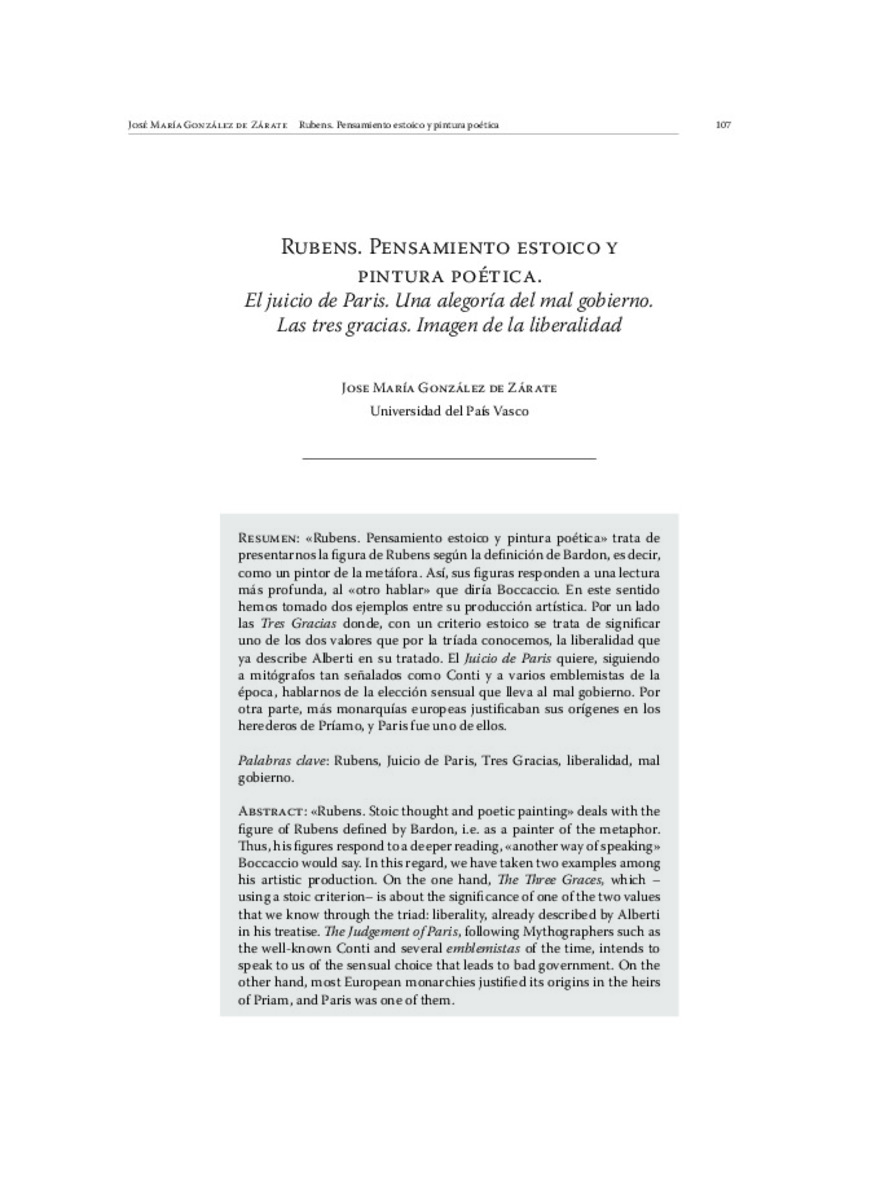Mostrar el registro sencillo del ítem
Rubens. Pensamiento estoico y pintura poética. El juicio de París. Una alegoría del mal gobierno. Las tres gracias. Imagen de la liberalidad.
| dc.contributor.author | González de Zárate, Jose María | |
| dc.date.accessioned | 2016-02-18T09:25:12Z | |
| dc.date.available | 2016-02-18T09:25:12Z | |
| dc.date.issued | 2012 | |
| dc.identifier.uri | http://hdl.handle.net/10234/150505 | |
| dc.description.abstract | «Rubens. Pensamiento estoico y pintura poética» trata de presentarnos la fi gura de Rubens según la defi nición de Bardon, es decir, como un pintor de la metáfora. Así, sus fi guras responden a una lectura más profunda, al «otro hablar» que diría Boccaccio. En este sentido hemos tomado dos ejemplos entre su producción artística. Por un lado las Tres Gracias donde, con un criterio estoico se trata de signifi car uno de los dos valores que por la tríada conocemos, la liberalidad que ya describe Alberti en su tratado. El Juicio de Paris quiere, siguiendo a mitógrafos tan señalados como Conti y a varios emblemistas de la época, hablarnos de la elección sensual que lleva al mal gobierno. Por otra parte, más monarquías europeas justifi caban sus orígenes en los herederos de Príamo, y Paris fue uno de ellos. | ca_CA |
| dc.description.abstract | «Rubens. Stoic thought and poetic painting» deals with the fi gure of Rubens defi ned by Bardon, i.e. as a painter of the metaphor. Th us, his fi gures respond to a deeper reading, «another way of speaking» Boccaccio would say. In this regard, we have taken two examples among his artistic production. On the one hand, Th e Th ree Graces, which – using a stoic criterion– is about the signifi cance of one of the two values that we know through the triad: liberality, already described by Alberti in his treatise. Th e Judgement of Paris, following Mythographers such as the well-known Conti and several emblemistas of the time, intends to speak to us of the sensual choice that leads to bad government. On the other hand, most European monarchies justifi ed its origins in the heirs of Priam, and Paris was one of them. | ca_CA |
| dc.format.extent | 26 p. | ca_CA |
| dc.format.mimetype | application/pdf | ca_CA |
| dc.language.iso | spa | ca_CA |
| dc.relation.isPartOf | Potestas, 5 (2012) | ca_CA |
| dc.rights.uri | http://creativecommons.org/licenses/by-sa/4.0/ | * |
| dc.subject | Rubens | ca_CA |
| dc.subject | Juicio de París | ca_CA |
| dc.subject | Tres Gracias | ca_CA |
| dc.subject | liberalidad | ca_CA |
| dc.subject | mal gobierno | ca_CA |
| dc.subject | Judgement of Paris | ca_CA |
| dc.subject | Three Graces | ca_CA |
| dc.subject | liberality | ca_CA |
| dc.subject | bad government | ca_CA |
| dc.title | Rubens. Pensamiento estoico y pintura poética. El juicio de París. Una alegoría del mal gobierno. Las tres gracias. Imagen de la liberalidad. | ca_CA |
| dc.type | info:eu-repo/semantics/article | ca_CA |
| dc.identifier.doi | http://dx.doi.org/10.6035/Potestas.2012.5.5 | |
| dc.rights.accessRights | info:eu-repo/semantics/openAccess | ca_CA |
| dc.relation.publisherVersion | http://www.e-revistes.uji.es/index.php/potestas/article/view/1661/1443 | ca_CA |








